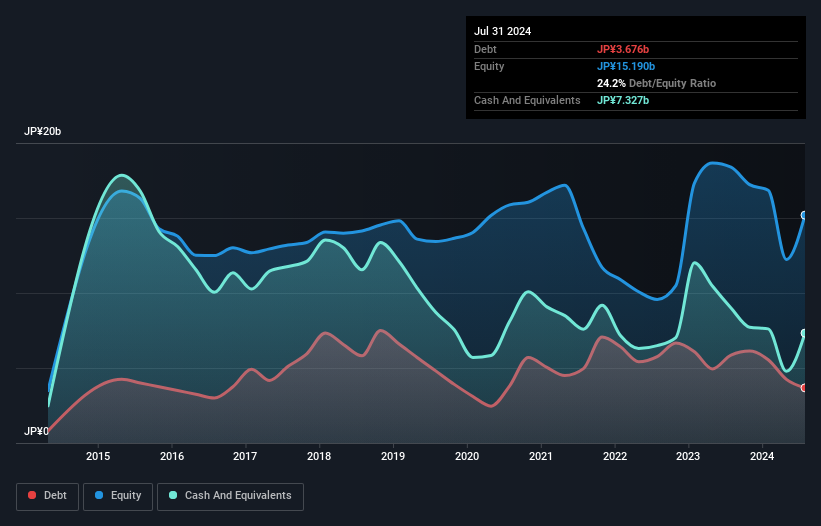Warren Buffett famously said, 'Volatility is far from synonymous with risk.' It's only natural to consider a company's balance sheet when you examine how risky it is, since debt is often involved when a business collapses. We can see that gumi Inc. (TSE:3903) does use debt in its business. But should shareholders be worried about its use of debt?
What Risk Does Debt Bring?
Generally speaking, debt only becomes a real problem when a company can't easily pay it off, either by raising capital or with its own cash flow. In the worst case scenario, a company can go bankrupt if it cannot pay its creditors. However, a more frequent (but still costly) occurrence is where a company must issue shares at bargain-basement prices, permanently diluting shareholders, just to shore up its balance sheet. Having said that, the most common situation is where a company manages its debt reasonably well - and to its own advantage. The first thing to do when considering how much debt a business uses is to look at its cash and debt together.
See our latest analysis for gumi
What Is gumi's Net Debt?
The image below, which you can click on for greater detail, shows that gumi had debt of JP¥3.68b at the end of July 2024, a reduction from JP¥5.86b over a year. But it also has JP¥7.33b in cash to offset that, meaning it has JP¥3.65b net cash.

How Healthy Is gumi's Balance Sheet?
According to the last reported balance sheet, gumi had liabilities of JP¥4.65b due within 12 months, and liabilities of JP¥1.65b due beyond 12 months. Offsetting this, it had JP¥7.33b in cash and JP¥1.32b in receivables that were due within 12 months. So it actually has JP¥2.34b more liquid assets than total liabilities.
This short term liquidity is a sign that gumi could probably pay off its debt with ease, as its balance sheet is far from stretched. Succinctly put, gumi boasts net cash, so it's fair to say it does not have a heavy debt load! There's no doubt that we learn most about debt from the balance sheet. But you can't view debt in total isolation; since gumi will need earnings to service that debt. So if you're keen to discover more about its earnings, it might be worth checking out this graph of its long term earnings trend.
In the last year gumi had a loss before interest and tax, and actually shrunk its revenue by 15%, to JP¥12b. We would much prefer see growth.
So How Risky Is gumi?
By their very nature companies that are losing money are more risky than those with a long history of profitability. And the fact is that over the last twelve months gumi lost money at the earnings before interest and tax (EBIT) line. And over the same period it saw negative free cash outflow of JP¥6.5b and booked a JP¥5.3b accounting loss. But at least it has JP¥3.65b on the balance sheet to spend on growth, near-term. Even though its balance sheet seems sufficiently liquid, debt always makes us a little nervous if a company doesn't produce free cash flow regularly. There's no doubt that we learn most about debt from the balance sheet. But ultimately, every company can contain risks that exist outside of the balance sheet. To that end, you should learn about the 3 warning signs we've spotted with gumi (including 1 which can't be ignored) .
If, after all that, you're more interested in a fast growing company with a rock-solid balance sheet, then check out our list of net cash growth stocks without delay.
New: AI Stock Screener & Alerts
Our new AI Stock Screener scans the market every day to uncover opportunities.
• Dividend Powerhouses (3%+ Yield)
• Undervalued Small Caps with Insider Buying
• High growth Tech and AI Companies
Or build your own from over 50 metrics.
Have feedback on this article? Concerned about the content? Get in touch with us directly. Alternatively, email editorial-team (at) simplywallst.com.
This article by Simply Wall St is general in nature. We provide commentary based on historical data and analyst forecasts only using an unbiased methodology and our articles are not intended to be financial advice. It does not constitute a recommendation to buy or sell any stock, and does not take account of your objectives, or your financial situation. We aim to bring you long-term focused analysis driven by fundamental data. Note that our analysis may not factor in the latest price-sensitive company announcements or qualitative material. Simply Wall St has no position in any stocks mentioned.
About TSE:3903
Excellent balance sheet and slightly overvalued.
Similar Companies
Market Insights
Community Narratives


Recently Updated Narratives

Constellation Energy Dividends and Growth

CoreWeave's Revenue Expected to Rocket 77.88% in 5-Year Forecast

Bisalloy Steel Group will shine with a projected profit margin increase of 12.8%
Popular Narratives


MicroVision will explode future revenue by 380.37% with a vision towards success


NVDA: Expanding AI Demand Will Drive Major Data Center Investments Through 2026



